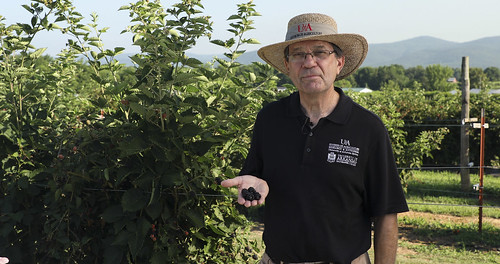Virtual blackberry field day brings the farm to you
By Emily Thompson
U of A System Division of Agriculture
July 20, 2018
Fast Facts:
- Division of Agriculture a no-cost virtual field trip to blackberry farms
- Primocane blackberries produce fruit in the early fall when market prices peak
(550 words)
(With additional art at: https://flic.kr/s/aHsmoBj67W )
(Download this story in MS Woird format here.)
LITTLE ROCK— Commercial and blackberry growers: the University of Arkansas System Division of Agriculture is bringing your fruit’s Aug. 15 field trip from Washington County’s Stay-N-Step Farm directly to your device.
Blackberries are no small part of the commercial horticulture landscape. According to the National Agricultural Statistics Service, blackberry production in the United States was valued at $26 million, with $5 million coming from fresh market sales, and $21 million came from processed sales.
The no-cost virtual field trip is being hosted by the University of Arkansas System Division of Agriculture and will focus on primocane blackberries– a critical innovation in caneberry production. Currently floricane-fruiting varieties, which produce fruit in the early summer, are more widely used.
“Primocane fruiting blackberry varieties allow for two crops to be produced from the same plant and for fruiting to occur up until frost -- based on local climatic conditions,” said Karen Ballard, professor-Program and Staff Development, and the driver behind the virtual field day. “Being able to produce blackberries for up to six months a year is a big deal; whether you are a commercial fruit producer or a backyard gardener. In the blackberry world, this is a breakthrough.”
Last year, primocane blackberries were harvested in Arkansas up to the first week in December. Primocane fruiting blackberry varieties can extend the production period from the traditional four- to six-week harvest period in the spring to over six months.
John Clark, distinguished professor of Horticulture for the Division of Agriculture developed many of the primocane varieties.
“Blackberries are an important fruit crop in the Southeastern United States. Although the majority of varieties that are grown are traditional floricane-fruiting varieties, there is an interest in using primocane-fruiting types to provide berries at a time of year when market prices are at their peak,” said Sherri Sanders, White County extension agent for the Division of Agriculture.
For the past two years, the Division of Agriculture has conducted research on the importance fall producing blackberry system, how to manage those late summer high temperatures with mineral particle films and how to use mineral particle film sprays to provide protections from insects and disease. The 55-minute interactive webinar will take participants inside one of the three farms where this research was conducted to get a first-hand look at their findings.
“By participating in the virtual field trip, participants will learn the differences between primocane and floricane crops, general primocane management practices, implications of Surround product use to suppress disease and pests through early to mid-season, potential consumer acceptance issues with white-washed berries, the use of farm planning and budgeting tools and observations from the grower’s perspective,” Sanders said.
The Virtual Field Trip broadcast will feature Clark, Sanders and other Division of Agriculture research and extension faculty, including: Terry Kirkpatrick, department head for entomology and plant pathology, Donn Johnson, professor-Entomology; Jennie Popp, associate dean of the honors college at the University of Arkansas-Fayetteville, Leah English, research program associate for agricultural economics and agribusiness and fruit producer Les Dozier.
The research was funded through the Southern SARE – Sustainable Agriculture Research and Education -- and took place at farms in Texas and Arkansas. The funding continues through Oct. 1.
For more information contact Karen Ballard at (501) 671-2218 or kballard@uada.edu.
About the Division of Agriculture
The University of Arkansas System Division of Agriculture’s mission is to strengthen agriculture, communities, and families by connecting trusted research to the adoption of best practices. Through the Agricultural Experiment Station and the Cooperative Extension Service, the Division of Agriculture conducts research and extension work within the nation’s historic land grant education system.
The Division of Agriculture is one of 20 entities within the University of Arkansas System. It has offices in all 75 counties in Arkansas and faculty on five system campuses.
The University of Arkansas System Division of Agriculture is an equal opportunity institution. If you require a reasonable accommodation to participate or need materials in another format, please contact (501) 671-2218 as soon as possible. Dial 711 for Arkansas Relay.
# # #
Media Contact: Ryan McGeeney
Communication Services
U of A System Division of Agriculture
Cooperative Extension Service
(501) 671-2120
rmcgeeney@uada.edu
